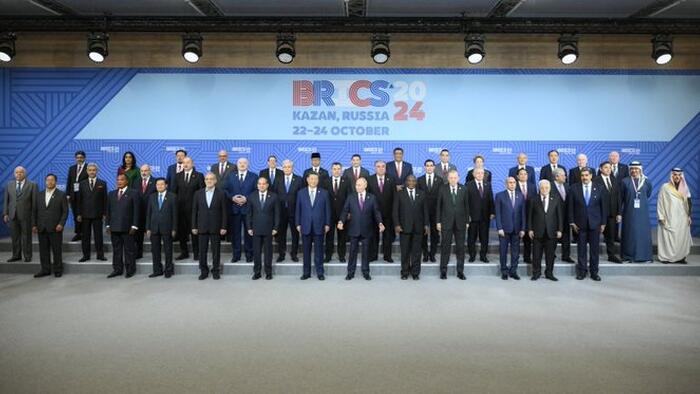On the final day of the BRICS summit in Kazan, President Vladimir Putin delivered a robust defense of Russia against foreign adversaries’ attempts to undermine the nation through military conflict, declaring such efforts as “illusory.” He encapsulated his sentiments by asserting that these adversaries aim to secure a strategic defeat against Russia, a notion he termed as a misunderstanding of the country’s historical resilience. Putin highlighted that the ongoing Ukraine crisis is fundamentally a proxy war, where Ukraine is being leveraged to pose significant security threats to Russia, thereby jeopardizing its vital interests. In his remarks, he underscored the necessity for the global community to recognize the legitimate concerns of the Russian-speaking populace, particularly in the disputed Donbass region, where Russian military operations have intensified.
The Russian president emphasized the importance of creating a balanced and stable Eurasian security environment through collaborative efforts like BRICS. He pointed out that by uniting forces, member nations could ensure lasting stability and facilitate peaceful development across the continent. Moving beyond the Ukraine conflict, Putin addressed the escalating Gaza crisis, linking it to a broader narrative of global instability. He condemned terrorism and urged for urgent action to address the plight of the Palestinian people, stating that the establishment of an independent Palestine is crucial for peace in the Middle East. Putin argued that rectifying historical injustices faced by Palestinians would serve as a cornerstone for regional tranquility.
Putin’s discourse at the summit reiterated the theme of multipolarity in global affairs, rejecting the notion of Western hegemony. He critiqued the Western strategy aimed at global domination, suggesting that such actions erode the pillars of international strategic stability and endanger the principles of collective security. Particularly, he took aim at the U.S. approach of “weaponizing” the dollar, which he claimed undermines confidence in the currency. By asserting that Russia is not seeking to abandon the dollar but rather being obstructed from utilizing it, Putin stressed the necessity for alternative financial systems, which coincidentally is a trend that is gaining traction among numerous nations.
Counter to Putin’s narrative, Venezuela’s President Nicolás Maduro presented a fiery condemnation of military actions in the Middle East, criticizing Israel for its tactics. He expressed anguish over the human toll in conflict regions, including Gaza and Lebanon, declaring that each missile strike represents a failure of international systems and the quest for a new global order. Maduro’s words resonated with calls for a deeper examination of the consequences of military aggression and a push for reform in the international governance structures, reflecting a shared sentiment among BRICS nations toward establishing equitable solutions for conflict resolution.
Supporting this stance, Chinese President Xi Jinping echoed the call for BRICS to emerge as a stabilizing entity in global peace efforts. Xi stressed the urgency of advocating for a ceasefire in Gaza, reigniting the push for a two-state solution, and curtailing the spillover of violence into neighboring regions such as Lebanon. His comments, alongside a visibly warm rapport with Putin during the summit, showcased a united front among BRICS leaders in tackling pressing international issues while fostering dialogues toward peace and security in volatile zones.
Despite the unified front presented at the summit, criticisms surrounding the Russian invasion of Ukraine were not absent. UN Secretary-General Antonio Guterres cautioned against the implications of Russia’s military actions, labeling them as a “dangerous precedent” for global conflict norms. This critique embodies the complex dynamics at play, within which BRICS operates as a coalition of diverse perspectives seeking to challenge established geopolitical paradigms while navigating internal and external criticisms. In conclusion, the BRICS summit encapsulated a platform of solidarity, advocating for multipolarity, economic cooperation, and a rethinking of international security frameworks in light of ongoing global crises.

